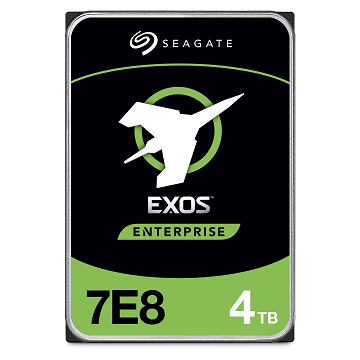Sustainability Report*
Sustainability @ Seagate
Seagate is committed to sustainable storage. Our engineering focus is on increasing storage capacity and utilization, while controlling the quantity and types of materials we use, and improving energy efficiency and recyclability.
Sustainable Design Features
- Exos 7E8 hard drives support up to 8TB per drive, offering bulk data storage for data center infrastructures requiring a highly reliable enterprise hard drive.
- Meets storage workload requirements in the most efficient and cost-effective data center footprint on the market today.
- Programmable power management PowerChoiceTM allows the user to to tailor systems for reduced power consumption.
- Annualized Failure Rate (AFR) of 0.44%.
- Compliant with RoHS requirements in China and Europe.
Energy and Greenhouse Gases
Manufacturing and using our products requires energy and produces Greenhouse Gas (GHG) emissions. We assess life cycle energy and GHG impacts and work towards improving energy and GHG efficiency, and reducing ownership costs with each new generation of our products.
| Power Consumption |
Per Unit |
Per TB |
| Average Idle Power (W) |
5.3 |
1.3 |
| Standby (W) |
0.8 |
0.2 |
| Operating (W) |
6.3 - 9.9 |
1.6 - 2.5 |
| Average Annual (kWh) |
46.4 |
11.6 |
Greenhouse Gas Emissions by Life Stage
*Exos 7E8 *ST4000NM000A, CIMARRON,4000GB,256MB,SATA,3D/6H
Safer Materials
As a leading supplier to major original equipment manufacturers, Seagate helps to establish standards for direct materials – components that make up our products -- to meet customers’ strictest specifications. We are meticulous about cataloging restricted substances; currently we list more than 2,000.
Human Toxicity by Life Stage
Scarce Resources
We aim to reduce our use of scarce resources during the life cycle of our products. We assess the water and metal depletion impacts of our products in order to minimize dependence on key natural resources, and reduce manufacturing and product ownership costs.
Metal Depletion by Life Stage
Water Depletion by Life Stage
Materials Efficiency and Circularity
Seagate recognizes the traditional “take, make, dispose” linear approach to business is unsustainable. We measure our progress towards a circular economy with a variety of indicators including material used per TB of storage, use of recycled content, reuse rates, and recycling type and efficiency.
| Device Weight - Shipped (g) |
Per Unit |
Per TB |
| Drive |
Enclosure |
528 |
132 |
| Media |
13 |
3 |
| Electronics |
108 |
27 |
| Packaging |
Cardboard and paper |
44 |
11 |
| Other materials |
19 |
5 |
| Total |
712 |
178 |
| Key Circularity Parameters |
Per Unit |
| Estimated Operating Life |
5 years |
| Recycled aluminum and steel content |
world average |
| Recycled cardboard |
100% |
| Reused content |
zero |
| Recycling rate |
25% |
| Residual disposal |
50% incineration/50% landfill |
| Reuse rate |
zero |
| Recycling efficiency |
95% |
| Recycling collections efficiency |
90% |
Seagate measures and reports its product sustainability performance on a TB-year basis. Seagate's drives come in different storage sizes and have different estimated useful lives. When referring to drive capacity, one terabyte, or TB, equals one trillion bytes. The TB-year measure combines these factors so that sustainability performance data is comparable across products and that annual impacts are directly reported.
Seagate’s sustainability assessment tools used to generate the product sustainability analysis have been verified by UL in accordance with ISO 14040, ISO 14044, and the World Resources Institute and World Business Council for Sustainable Development's GHG Protocol Product Life Cycle Accounting and Reporting Standard.
© 2019 Seagate Technology LLC. All rights reserved. Printed in USA. Seagate, Seagate Technology and the Wave logo are registered trademarks of Seagate Technology LLC in the United States and/or other countries. Seagate reserves the right to change, without notice, product offerings or specifications. DS1663.4-0911US, March 2016
Print Report
















